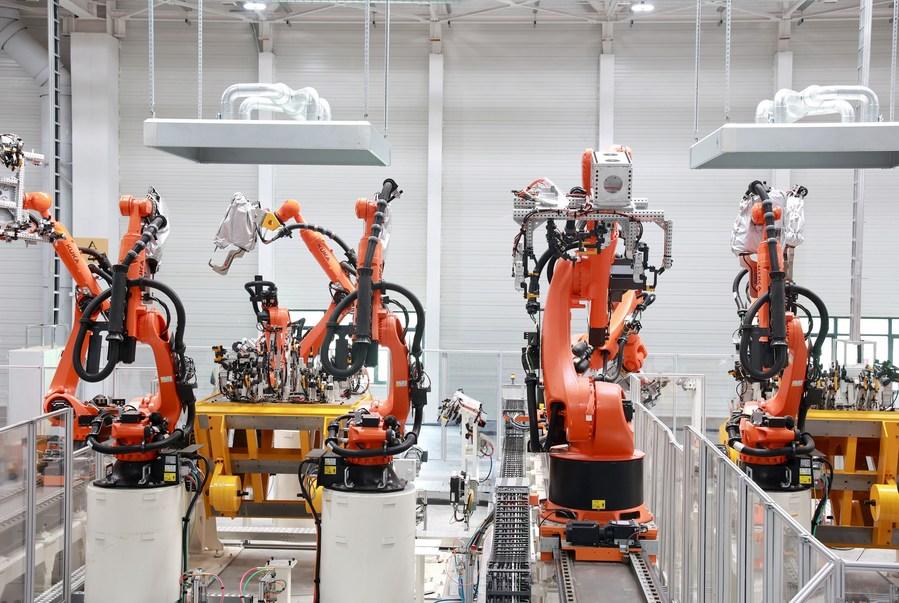
 0 Comment(s)
0 Comment(s) Print
Print E-mail Xinhua, December 13, 2023
E-mail Xinhua, December 13, 2023

This photo taken on July 4, 2022 shows a workshop of the Volkswagen Anhui MEB (modular electric drive matrix) plant under construction in east China's Anhui Province. [Photo/Xinhua]
German carmaker Volkswagen Group has announced that Volkswagen (China) Technology Co., Ltd., the group's Chinese company and its largest research and development center outside its German headquarters, will launch an electric vehicle platform for the entry-level market in three years and develop pure electric models tailored for Chinese customers.
The move highlights the determination of Europe's largest car company to integrate further into the Chinese market, and epitomizes the close cooperation between China and the European Union.
This year marks the 20th anniversary of the comprehensive strategic partnership between China and the EU. By the end of 2022, China-EU trade had climbed to 847.3 billion U.S. dollars, with the two sides being each other's second-largest trading partners.
As major economies, the two sides have maintained mutually beneficial cooperation and worked together to produce fruitful results over the past 20 years.
Volkswagen (China) Technology Co., Ltd., with an approximate total investment of 1 billion euros (about 1.08 billion U.S. dollars), plans to begin operations in early 2024 in Hefei City, east China's Anhui Province. Focusing on the research and development of intelligent connected vehicles, the company is committed to reducing the time to market of its automotive and component products by 30 percent.
As the group advances the development of its electric vehicle platform for the entry-level Chinese market, it will undertake more important development work under its "In China for China" strategy, said Ralf Brandstatter, chairman and CEO of Volkswagen Group China.
The new platform is expected to be brought to market within 36 months, meaning its development cycle will be reduced by about a third while allowing the company to broaden its client base rapidly in the dynamic Chinese electric vehicle market, Brandstatter said.
It is worth noting that the company is working to integrate the advanced technologies of local suppliers in its development to maximize the innovative power of the Chinese market.
At the supplier park it is constructing in Hefei, approximately 1,100 local suppliers will provide hardware and software solutions to ensure the incorporation of the most advanced technologies and application concepts in the early stages of new product development.
Like Volkswagen Group, many other German companies have set their sights on China and chosen to put down roots in the country.
Weilburger Coatings (Tianjin) Limited, which is engaged in the research, development and manufacturing of rail transit coatings and high-temperature non-stick coatings, began operating in north China's Tianjin Municipality in 2020. The company's annual sales volume has exceeded 100 million yuan (about 14.05 million U.S. dollars), with an approximate annual output of 1,200 tonnes of coatings.
With the rapid development of high-speed rail in China and the increasing consumer demand for high-temperature, non-stick cookware, Weilburger Coatings sees broad development opportunities for the two main businesses in China, according to its site manager Felix Tian.
As the company's only production base in China, the Tianjin plant is targeting the rapid development of China's new energy vehicle and yacht sectors to expand its products and technologies to a larger market.
"We firmly believe that the future of manufacturing is in China, and we will continue to be optimistic about the Chinese market," Tian said.
For many German companies, China is not only an important production base and sales market for future development, but also a trustworthy partner.
German materials manufacturer Covestro has participated in the China International Import Expo (CIIE) for three consecutive years. During the sixth CIIE this year, Covestro signed a strategic cooperation intention document with Huafon Group to develop low-carbon solutions.
And German pharmaceutical company Boehringer-Ingelheim is accelerating its introduction of global innovative products, solutions and advanced concepts to China, promoting concurrent innovation in China and around the world.
According to a survey conducted by the German Chamber of Commerce in China, more than half of the 288 surveyed German companies plan to increase their investment in China in the next two years to remain competitive in this important market.
Many European companies are also casting their votes of confidence in China, embracing the mutually beneficial environment in the country.
At the end of September, European aircraft manufacturer Airbus broke ground on its second final assembly line in Tianjin as part of its expansion in the Chinese market.
This is a powerful vote of confidence in the future of aviation in China, Airbus CEO Guillaume Faury said, adding that it also underlines Airbus' long, trustworthy and successful relationship with its partners in China.
Production lines are running steadily in a new factory of ADB Safegate in Tianjin. Headquartered in Belgium, the ADB Safegate manufactures airport navigation aid products.
The factory's products are widely used in large and medium-sized airports in China, and also exported to Europe, the Middle East, and Southeast Asia, said Yang Xinyu, vice president operation of ADB Safegate in China.
According to the European Business in China Business Confidence Survey 2023, more than 90 percent of surveyed enterprises plan to use China as an investment destination, with 59 percent of those respondents saying that China is currently among the three major investment destinations.
Over the past 20 years, both the scale and quality of China-EU economic and trade exchanges have been expanding and improving. The two sides have developed a strong, symbiotic economic relationship, said Chen Jingyue, executive vice president and secretary general of the China-Europe Association for Technical and Economic Cooperation.